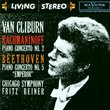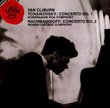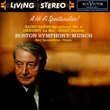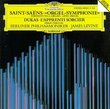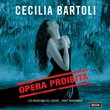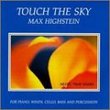| All Artists: Jacques Ibert, Maurice Ravel, Paul Paray, Harold Lawrence, Detroit Symphony Orchestra Title: Ibert: Escales; Ravel: Rapsodie, etc Members Wishing: 0 Total Copies: 0 Label: Philips Release Date: 9/12/1990 Genre: Classical Styles: Historical Periods, Modern, 20th, & 21st Century Number of Discs: 1 SwapaCD Credits: 1 UPC: 028943200325 |
Search - Jacques Ibert, Maurice Ravel, Paul Paray :: Ibert: Escales; Ravel: Rapsodie, etc
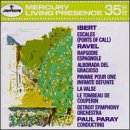 | Jacques Ibert, Maurice Ravel, Paul Paray Ibert: Escales; Ravel: Rapsodie, etc Genre: Classical
|
Larger Image |
CD DetailsSimilarly Requested CDs
|
CD ReviewsTerrific Performances - FABULOUS Sound Craig Matteson | Ann Arbor, MI | 07/03/2002 (5 out of 5 stars) "Paul Paray was a great conductor and contributed a great deal to the musical heritage of Detroit even if that isn't remembered as deeply as it should be. I bought this disk because of his musicianship and expected it to be full of wonderful performances and somewhat old sounding recording. I was wrong. It is full of wonderful performances and amazing sound. The power and depth of the sound is some of the best I have ever heard. They should still make recordings this way because a lot of the new stuff doesn't sound as good. I want to get more of these Mercury Living Presence 35mm recordings. Wow!And - remember that there is not such thing as too much Ravel (at least I don't think there is)." This is how it's done Mark McCue | Denver, CO USA | 02/12/1999 (5 out of 5 stars) "Paul Paray premiered Ibert's Escales and has a remarkably clear-eyed view of it. He was 75 when he made this, his second, recording of it with the Detroit Symphony. Eschewing the temptation to make something decent of it ala Stokowski, Martinon and Rodzinski among others, Paray gives us his ports of call in technicolor and panavision, just like a 1950s travel poster: glossy, gorgeously played and recorded, never rushed but never static. It is what it is and no more, but it's wondeful listening.The other classics are those of the composers themselves and the conductor. Nowhere do they or he acquit themselves better than here. Again, the late 50s-early 60s (some 35mm) sound is extraordinary and lavished on the right material and maestro. In La Valse and Pavane especially we get that nasty, bitter undertow of the Gallic sensibility. Paray gets it from sticking to the score but roaming all around and through it to lead us where we've never been before." Very good to among the best available. R. J. Claster | Van Nuys, CA United States | 05/05/2002 (5 out of 5 stars) "Paray is one of the best conductors in this repertoire. His performances are, in general, marked by somewhat dry, lean textures and crisp, driving rhythms, leavened, however, by enough nuance and suppleness of phrasing to bring out the distinctive character of this music. As to this particular collection, my only caveats are that the Rhapsodie is somewhat staid and square, lacking either the sensuous warmth of the Martinon-Chicago, or the fiery impulsivity of the Munch-Boston, both on RCA. Also, the first movement of Escales (Rome-Palermo) lacks the contrast between the languor of the opening passages and the driving tarantella rhythms that follow, which Munch achieves very tellingly in his Boston recording. On the other hand, Le Tombeau is my favorite because Paray's light, crisp approach brings out the dance rhythms more effectively than in other performances I have heard, and the La Valse has all the fire and drive of the Munch-Boston, but with nuances of phrasing that impart more subtlety to this piece than in Munch's more one dimensional approach. Lovers of Ravel should get this collection."
|

 Track Listings (14) - Disc #1
Track Listings (14) - Disc #1